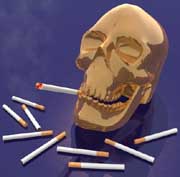| Home A B C D E F G H I J K L M N O P Q R S T U V W X Y Z |
|
Home |
Emphysema: Symptoms, Causes and Treatment |
||
Emphysema SymptomsEmphysema is a lung disease that causes permanent damage of the airways of a person's lungs. It causes shortness of breath and becomes worse as time goes by. It is caused by exposure to poisonous chemicals such as tobacco, the main cause being cigarette smoking. Other causes are air pollution, exposure to dust and chemicals, frequent lower respiratory infections and second-hand smoke. According to the Mayo Clinic, the main symptoms of emphysema are shortness of breath and a reduced capacity for physical activity. Both symptoms get worse with time. The first sign of emphysema is shortness of breath during physical activity. Eventually, this shortness of breath occurs even when a person is resting. Shortness of breath occurs because air gets trapped in the air sacs of damaged lungs. This means that when the person takes the next breath, his lungs will already have air. The trapped air takes up space in the lungs and makes them deliver less oxygen to the blood. Less oxygen in the blood makes a person feel short of breath. When the lungs deliver less oxygen to the blood, there is a reduced capacity for physical activity. Other symptoms of emphysema are coughing, loss of appetite, weight loss and weakness. The cough caused by the disease could either be productive or not. This means that the person may produce sputum when he coughs or not. Loss of appetite and weight loss mostly happens because the sick person finds it very difficult to eat. When he eats, his stomach expands and presses against the diaphragm making it difficult to breathe. This results in loss of appetite and eventually in weight loss. Difficulty in breathing and lack of enough oxygen in the blood causes the sick person to feel weak. About The Author: |
Complementary and Alternative Treatments for Emphysema  Nutrition and Supplementation Before breakfast, drink a mixture of one teaspoonful of pure, cold-pressed olive oil and apple juice to provide essential fatty acids and help eliminate toxic waste. Experts recommend a raw-foods diet with emphasis on vegetables and raw fresh vegetable juices. Garlic and onions should be part of the daily diet. Frequent use of spicy foods, such as chili peppers, ginger, and horseradish, helps keep lungs clear of mucus. Avoid gas-forming foods, such as legumes and cabbage; any foods that require a great deal of chewing; and fried or greasy foods and salt. Also eliminate foods that form mucus, including meat, dairy products, wheat, junk foods, and processed foods. Daily supplements include:
(Consult your healthcare provider regarding the duration of treatment.) Aromatherapy Rub your chest with diluted essential oils of cedarwood, eucalyptus, peppermint, or pine for easier breathing. You also can place a few drops of one of the essential oils on a tissue or handkerchief and inhale deeply. Bodywork and Somatic Practices Try Oriental bodywork or reflexology. Soothing, restorative results will also come from Trager, craniosacral therapy, polarity therapy, Aston-Patterning, and Therapeutic Touch. Herbal Therapy To ease coughing and other discomforts of emphysema, choose one of the following herbal remedies: For excess mucus, try coltsfoot, thyme, or mullein tea before each meal. To make any of the teas, steep 1 to 2 teaspoons of the dried herb in 1 cup boiling water for 10 minutes; strain. If you're bothered by constant coughing, try either of two tea blends: equal amounts of coltsfoot, mullein, and licorice; or equal amounts of marshmallow, mallow, colts foot, mullein, violet, and red poppy flowers. To make either of the teas, steep 1 to 2 teaspoons of the blend in 1 cup of boiling water for 10 minutes. You also might try eating hot, spicy meals laced with generous amounts of cayenne or ginger. Other helpful herbs include comfrey, fennel seed, fenugreek, rosemary, and rose hips. Herbal products are available in health food stores and in some pharmacies and supermarkets. Follow package for specific directions. Hydrotherapy Steam inhalations are very effective for loosening and expelling mucus. Add a few drops of a favorite essential oil, if you wish. Under professional supervision, you also might try constitutional therapy or hot compress applications. Traditional Chinese Medicine Acupuncture: Acupuncture may be used to tone the lungs and improve circulation to the area, making it easier to breathe. This modality also can help relieve coughing spasms and curb nicotine cravings in emphysema sufferers who are trying to kick the tobacco habit. Acupressure: Manipulating various lung, conception vessel, and bronchial points can help quiet coughs and ease breathing. Chinese Herbal Therapy: Chinese herbs can be very effective in treating many symptoms of emphysema. Herbal formulas used to treat chronic bronchitis (as emphysema is sometimes called) are Pulmonary Tonic Pills, Ping Chuan, Bronchitis Pills (compound), Special Medicine for Bronchitis (also called Hsiao Keh Chuan, available in pill or liquid form), Shedanchuanbeye Extract, and Fritillaria Extract Pills. Cordyceps is often used alone or with a formula to tonify the lungs. Yoga and Meditation Any yoga pose that expands the lungs and relaxes the chest can help alleviate the discomforts of emphysema. Performing a daily routine of at least four poses, Fish, Camel, Bow, and Warrior, can be particularly beneficial. About The Author: |
|
|
|
||
|
Glossary References Links Contact
|